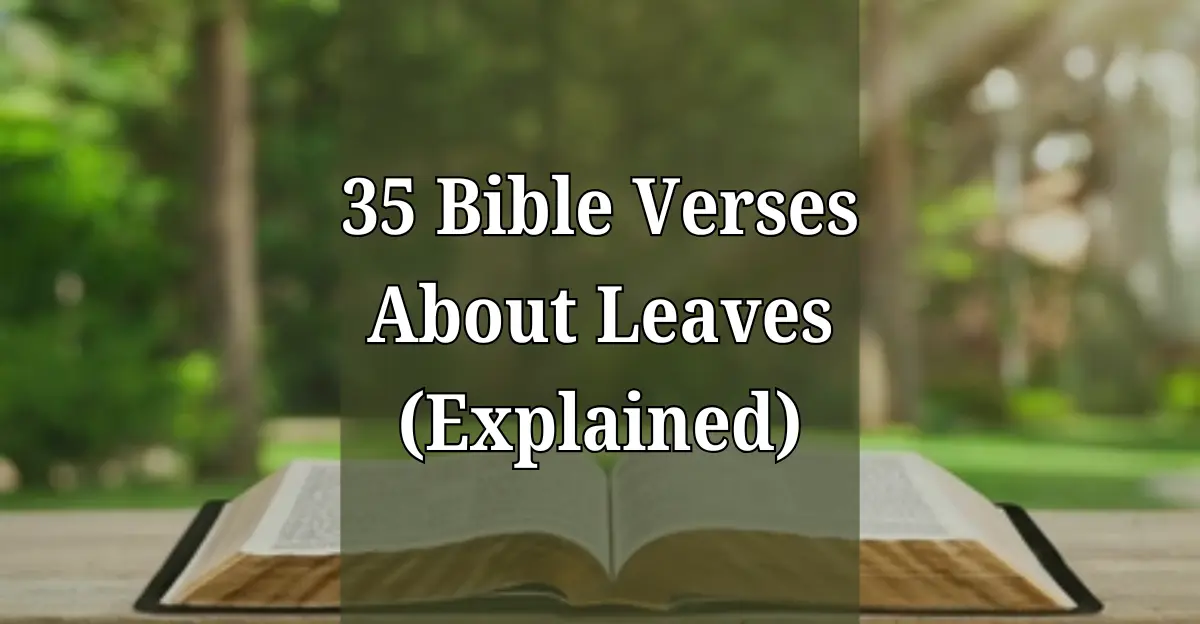Leaves in the Bible hold a profound spiritual meaning, symbolizing everything from growth to healing. As we dive into these 35 Bible verses, you’ll discover how the cycles of nature speak to our spiritual journey, offering valuable lessons for life. Let’s read how these verses can inspire and remind us of God’s continuous work in our lives!
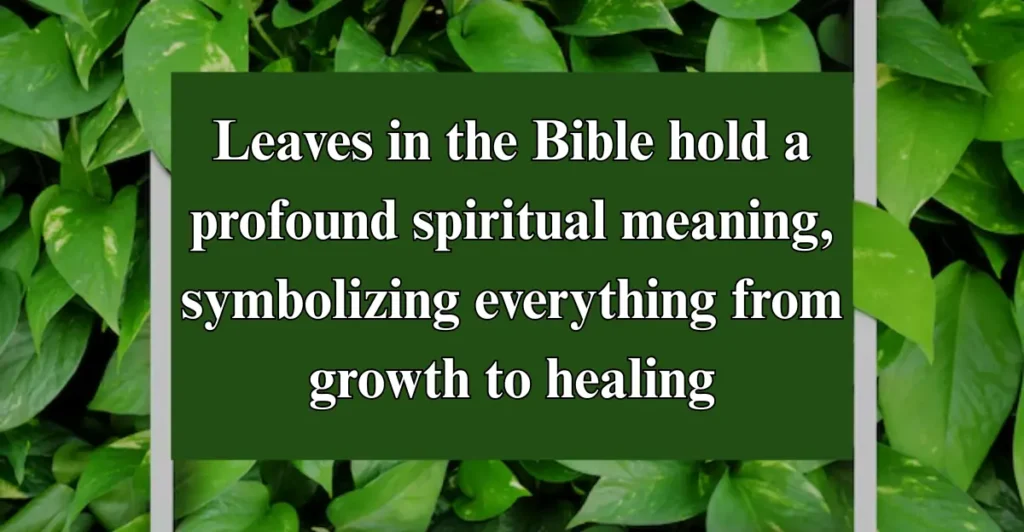
Table of Contents
Leaves as a Sign of Life
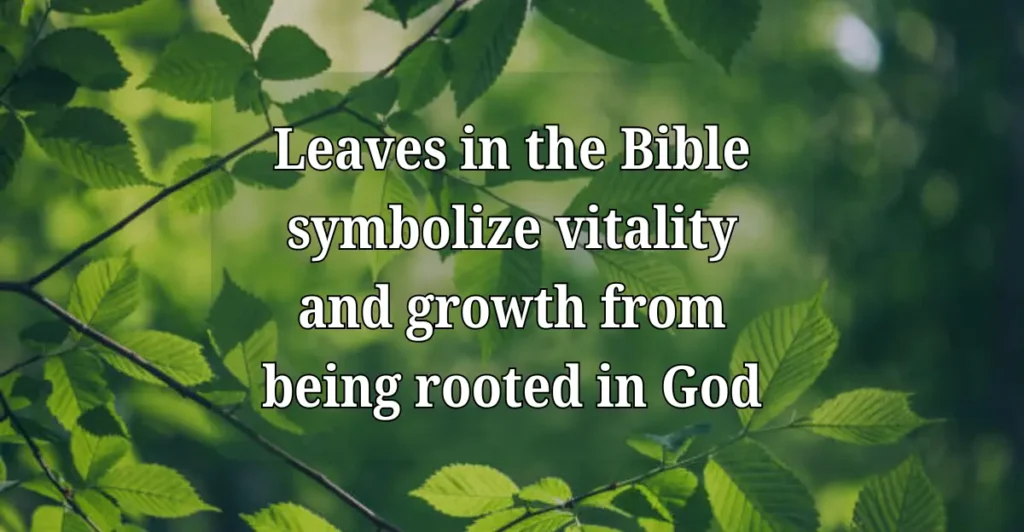
Leaves in the Bible symbolize vitality and growth from being rooted in God. Like a healthy tree, our life flourishes when connected to Him, leading to righteousness, health, and fruits that reflect His presence. Verses highlight how leaves are a sign of spiritual flourishing.
Personally, staying rooted in God has brought growth and peace into my life, much like flourishing leaves showing vitality.
Psalm 1:3
- He is like a tree planted by streams of water, which yields its fruit in season and whose leaves do not wither. Whatever he does prospers.
Psalm 1:3 highlights the benefits of being rooted in God’s Word, much like a tree planted near a riverbank. A person whose life aligns with God is compared to a tree that is vibrant, bearing fruit in its season. This symbolizes spiritual growth and prosperity, where their actions remain aligned with God’s will, leading to success and stability that does not fade.
I’ve found that when I stay rooted in my faith, I experience peace and prosperity in ways that reflect this verse. Just like the tree by the water, I feel nourished and fruitful when I prioritize my relationship with God.
Jeremiah 17:8
- They will be like a tree planted by the water that sends out its roots by the stream. It does not fear when heat comes; its leaves are always green. It has no worries in a year of drought and never fails to bear fruit.
Jeremiah 17:8 compares a person who trusts in the Lord to a tree planted by the water, drawing strength from a deep-rooted faith. Despite facing heat or drought, the tree’s leaves stay green, and it continues to bear fruit, symbolizing the resilience and steadfastness of those who rely on God. Such a person remains unwavering and productive even in difficult times.
I’ve seen how staying connected to God has helped me remain vibrant and resilient, especially during hard times when I feel most challenged. Much like the tree, I’ve learned that my faith can keep me green and fruitful no matter what life throws my way.
Ezekiel 47:12
- On both sides of the river, there will grow all kinds of trees for food. Their leaves will not wither, nor will their fruit fail. Every month they will bear new fruit, because the water from the Temple flows to them. Their fruit will be for food and their leaves for healing.
Ezekiel 47:12 highlights the perpetual growth and healing power that comes from being nourished by the river of God’s provision. The trees, with their leaves and fruit, symbolize life and restoration, continually offering food and healing every season. This imagery reminds us that as we stay connected to God’s divine flow, we are always sustained, nourished, and empowered to grow.
I’ve seen how remaining rooted in God’s Word and presence has allowed me to grow and receive healing, no matter the season. His provision has been a constant source of strength, even in challenging times.
Revelation 22:2
- On each side of the river, stood the tree of life, bearing twelve kinds of fruit, yielding its fruit every month. And the leaves of the tree were for the healing of the nations.
Revelation 22:2 describes the tree of life with leaves that offer healing to the nations. These leaves symbolize God’s plan of restoration, continuously bringing life and hope to all. The fruit and leaves signify the future blessings in God’s kingdom.
Personally, this verse reminds me that God’s healing and restoration are always available, no matter the challenges. It gives me hope that His life will flow into every part of my journey.
Isaiah 6:13
- But as the tree or the oak leaves a stump when it is cut down, so the holy seed will be the stump of the people.
Isaiah 6:13 uses the image of a tree that, even when cut down, leaves a stump which will eventually grow again. This remnant represents the faithfulness and restoration of God, symbolizing that even after judgment or destruction, there is always hope for new life and renewal. The seed within the stump will persist, and in God’s timing, life will rise again.
I’ve seen how even in moments of difficulty and loss, God’s promises of restoration have brought renewal. What seemed like the end was actually a starting point for new growth and hope in my life.
Leaves as a Sign of Healing
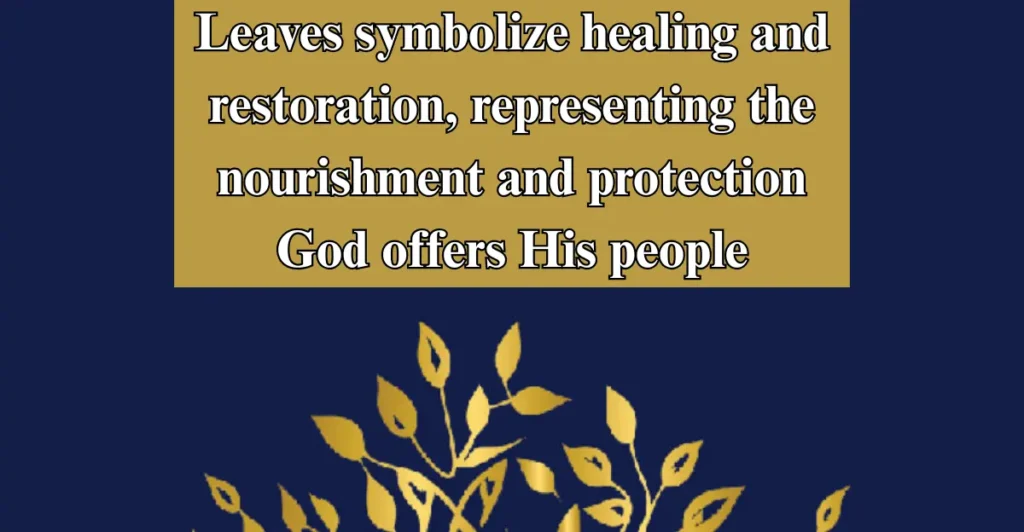
In the Bible, leaves symbolize healing and restoration, representing the nourishment and protection God offers His people. These verses highlight how leaves portray divine care, providing healing and strength to those who seek it.
I’ve personally experienced how God’s healing power has restored me during tough times, much like leaves nurturing a plant back to life. His divine care has always been my source of strength.
Ezekiel 47:12
- The leaves of the trees along the river are for healing, and the fruit they produce is available every month. The branches of these trees provide food, and the river flows with life-giving water that sustains and restores. These trees and their leaves symbolize God’s provision for His people, offering continuous nourishment and healing.
In this verse, the leaves and fruit are a powerful symbol of God’s provision, emphasizing His ability to sustain and restore life. The river that provides water reflects His life-giving power that never runs out, just like His mercy and healing for us. It reminds us that God’s care for us is constant and abundant.
I can relate to the constant healing that comes through God’s provision. There have been moments when I’ve felt depleted, but just like the trees by the river, His life-giving presence has always restored me.
Revelation 22:2
- In the middle of its street, and on either side of the river, was there the tree of life, which bare twelve fruits, and yielded her fruit every month: and the leaves of the tree were for the healing of the nations.
This verse portrays a profound image of God’s kingdom, where the tree of life stands as a symbol of eternal restoration. The leaves offer healing and wholeness, sustaining the nations forever. With each month, the tree provides fresh fruit, a continuous source of nourishment and peace, signifying God’s divine plan and His ultimate purpose for all creation.
I often think of how God’s healing power is ever-present, offering peace in every season of life. Just like the leaves in this verse, I find moments of renewal and restoration through my relationship with Him. It reminds me that no matter the challenges, His care is constant and life-giving.
Psalm 1:3
- He shall be like a tree planted by the rivers of water, that brings forth its fruit in its season, whose leaf also shall not wither; and whatever he does shall prosper.
This verse illustrates the life of a person who stays rooted in the Word of God, drawing nourishing, life-giving strength like trees by a riverbank. Their leaves remain green, symbolizing spiritual health, well-being, and continuous flourishing, as they prosper in all they do through spiritual prosperity.
I’ve seen how staying grounded in scripture keeps my mind and spirit thriving even during struggles it has been a constant source of healing, clarity, and life.
Genesis 3:7
- Then the eyes of both of them were opened, and they knew that they were naked; so they sewed fig leaves together and made themselves coverings.
This verse shows how Adam and Eve, after sinning, became aware of their nakedness and, filled with shame, tried to cover themselves with fig leaves, marking the first human attempt to hide guilt. Their efforts were temporary, revealing the limitations of man-made covering and the need for a deeper, redemptive solution from God.
I’ve experienced times when I tried to cover my mistakes with quick fixes, but real healing only came when I stopped trying to fix it on my own and let God lead me through the deeper process of restoration.
Jeremiah 8:22
- Is there no balm in Gilead, is there no physician there? Why then is there no healing for the wound of my people?
This verse expresses the prophet Jeremiah’s sorrowful cry over the suffering of his people, wondering why the expected healing, medicine, and physician from Gilead have not brought relief. It raises a divine question only God alone can bring true healing for the deepest wounds, beyond what any human remedy can offer.
I’ve personally faced emotional pain where nothing external helped, and in that silence, I experienced how only God’s intervention could heal what others simply can’t.
Leaves as a Sign of Change
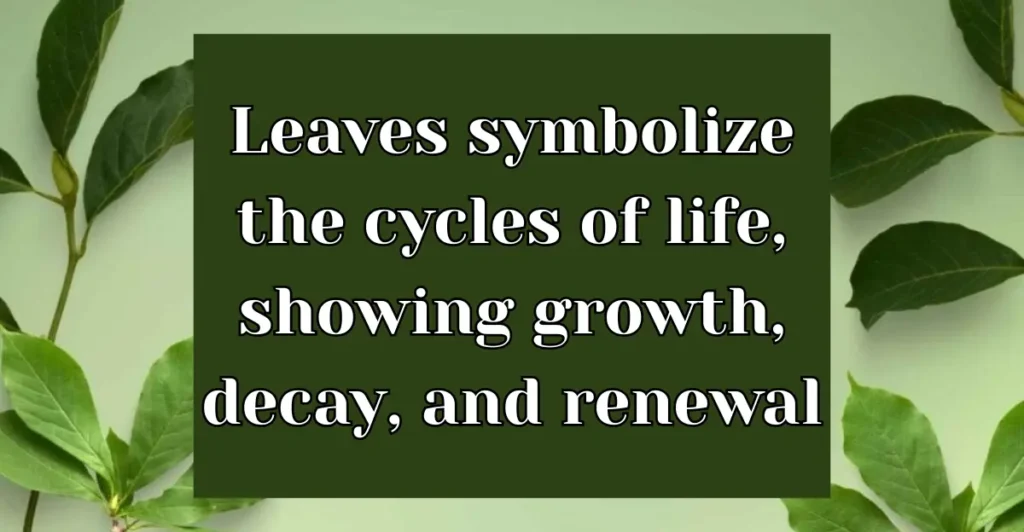
In the Bible, leaves symbolize the cycles of life, showing growth, decay, and renewal. These transformations are inevitable in our spiritual lives, reflecting the conditions we face and the change we undergo. The imagery of leaves in scripture is a sign of spiritual renewal, reminding us that even decay leads to new growth.
I’ve seen this in my own life moments of decay followed by spiritual renewal, much like the changing of seasons.
Matthew 24:32
- Now learn this lesson from the fig tree: As soon as its branches become tender and its leaves come out, you know that summer is near.
This verse shows how the leaves of the fig tree signal the change of season, just as spiritual signs indicate the nearness of Jesus’ return. Jesus teaches that the sprouting of leaves is a reminder of God’s unfolding plan and the impending arrival of His kingdom. We are encouraged to be aware of these signs in our lives.
I’ve found that the small changes I see in my life often reflect this process, where God’s plan unfolds in ways that are as certain as the coming summer.
Isaiah 34:4
- All the heavens will melt away like scrolls, the stars will fall from the sky, and the leaves will wither from the grapevine and the fig tree, and what is sown will shrivel.
This verse portrays a cosmic upheaval, where heavens and stars fall, and even the leaves and fig tree wither, symbolizing the inevitable decay of the world’s order. It reflects the transient nature of all creation, reminding us that change and transformation are inevitable as God’s plan unfolds.
I’ve realized that like the withered leaves, moments of decay often lead to growth and spiritual renewal.
Isaiah 64:6
- All of us have become like one who is infected and impure with sin; all our righteous deeds are like filthy rags. We all shrivel up like a leaf and like the autumn leaves, we wither and fall; our sins sweep us away like the wind.
This verse compares our sin to withered leaves, showing how human righteousness is like filthy rags apart from God. Just as autumn leaves fall and are carried away by the wind, our sins lead to decay and separation from God, emphasizing our need for His grace and forgiveness.
It reminds me that no matter how hard I try, my efforts are incomplete without God’s transformative power. His mercy is the true source of renewal and strength in my life.
Job 13:25
- Will You torment me like a wind-blown leaf, and chase me like straw?
Job compares his fragility to a wind-blown leaf, feeling powerless and vulnerable in the face of his suffering. The image of being chased by the wind highlights the overwhelming challenges he faces, symbolizing his inability to escape God’s judgment and his inner turmoil.
I’ve felt like that leaf at times, swept by circumstances beyond my control, yet trusting in God’s guidance helped me regain strength.
Mark 11:13
- Seeing in the distance a fig tree in full leaf, He went to find out if it had any fruit. When He reached it, He found nothing but leaves, because it was not the season for figs.
Jesus observes the fig tree with full leaves but no fruit, symbolizing how superficial faith can appear alive yet lack true spiritual fruit. The absence of real transformation highlights the deeper problem beneath the appearance of life.
I’ve learned that outward signs of faith can sometimes hide a lack of true spiritual growth. This verse reminds me that genuine faith requires more than just an external display.
Leaves as a Sign of Judgment
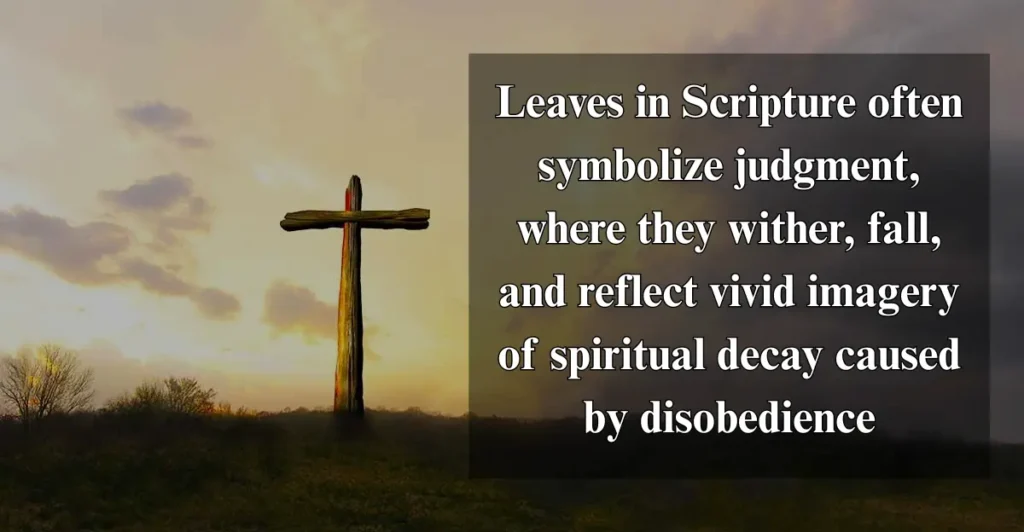
Leaves in Scripture often symbolize judgment, where they wither, fall, and reflect vivid imagery of spiritual decay caused by disobedience. This theme highlights the serious consequences of turning away from God, breaking the connection with Him and inviting divine correction.
I’ve felt this symbolism in seasons of distance from prayer where emotional heaviness mirrored a kind of inner withering reminding me to realign with God.
Isaiah 1:30
- You will be like a withered leaf, like a tree that is not nourished, and as a garden without water.
In this verse, the withered leaves represent the spiritual barrenness that occurs when one turns away from God’s presence. The imagery of a tree and garden without water symbolizes the judgment that follows disobedience and a lack of spiritual nourishment, warning us of the consequences of turning away from God.
I’ve seen how neglecting one’s spiritual health can leave us feeling dry and disconnected, much like a withered leaf. This verse serves as a personal reminder to stay rooted in God’s presence and continue seeking His guidance to remain nourished.
Jeremiah 8:13
- I will consume them, says the Lord. There will be no harvests for them, not even figs or grapes from the fruit trees; they will die, and all will be gone.
This verse speaks to the judgment that follows unfaithfulness, where the withering of leaves and the absence of fruit symbolize the consequences of turning away from God’s commands. The imagery of harvests failing is a stark reminder of how our spiritual neglect can lead to a loss of what once flourished in our lives.
I’ve seen how ignoring God’s commands can lead to a slow spiritual wither, leaving once vibrant areas of life barren and dry. It serves as a constant reminder to stay faithful and nourish my relationship with God to avoid these consequences.
Hosea 9:16
- Israel is obstinate, like a stubborn heifer; fed on the wind and the leaves will dry up; they will not bear fruit. Even though they give birth, I will kill their children.
In this verse, the imagery of leaves drying up and spiritual decay is used to highlight the consequences of disobedience and resisting God’s guidance. Just like a heifer led astray, Israel failed to heed God’s call, resulting in the decline of both their spiritual and physical prosperity. The fruit of their disobedience was the judgment that awaited them.
I’ve seen how stubbornness in not following God’s will can lead to a slow, inevitable decline in one’s life. When we resist His guidance, it’s like being fed on the wind empty and unproductive, unable to bear good fruit.
Isaiah 64:6
- We have all become like one who is infected and impure with sin; all our righteous deeds are like filthy rags. We all shrivel up like a leaf, and like the wind, our sins sweep us away.
This verse portrays our righteous deeds as filthy rags and compares us to withered leaves, showing the futility of human efforts without God’s mercy. Our sins blow us away like wind-blown leaves, reminding us that only through His grace can we be truly nourished.
From my experience, this reminds me how often I’ve relied on my own efforts, only to realize the need for God’s mercy and forgiveness.
Isaiah 34:4
- All the heavens will melt away, and the stars will fall from the sky, like withered leaves or shriveled figs from a fig tree. The sky will be rolled-up like a scroll, and all things will disappear.
This verse reflects the impermanence of the old creation, where the heavens and stars will vanish in a final judgment marking the end of the world’s order. The withered leaves symbolize the transience of all things, fading in God’s plan for a new creation and the fulfillment of His promises.
I often reflect on the passing of things in life, just as withered leaves remind me of the need to focus on the new in Christ. It’s a humbling reminder that everything in this world is temporary and ultimately under God’s control.
Leaves as a Sign of Beauty
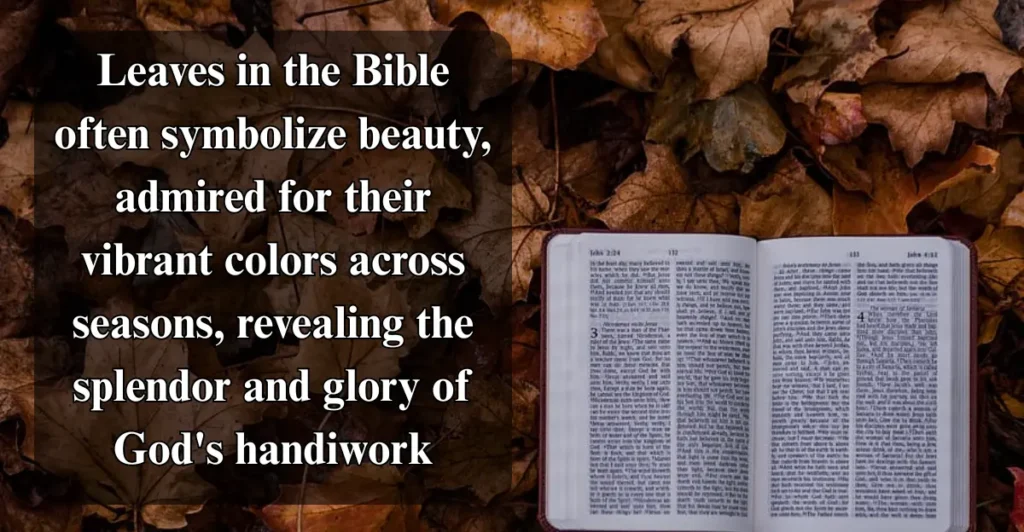
Leaves in the Bible often symbolize beauty, admired for their vibrant colors across seasons, revealing the splendor and glory of God’s handiwork. Their aesthetic value invites us to celebrate creation and reflect on the divine wonder woven into every detail.
I’m always moved by how even the smallest leaf can mirror God’s brilliance especially in autumn, when nature’s palette becomes a living reminder of His beauty.
Psalm 104:14
- He makes the grass grow for the livestock, and plants for people to cultivate bringing forth food from the earth. He also provides trees with leafy branches, and fills the earth with abundance and variety.
This verse emphasizes God’s provision for all living creatures, from the grass for the livestock to the trees that bear leafy branches and the plants that yield food. It showcases His creativity and the meticulous care He takes in providing for people and every aspect of creation, bringing forth beauty and abundance to the earth.
As I think about this verse, I’m reminded of how the earth’s abundance is a daily gift of God’s care for all. The simple, yet profound provision in grass and trees often reminds me of the small things that make life whole.
Genesis 1:29
- Then God said, ‘I give you every seed-bearing plant on the face of the earth and every tree that has fruit with seed in it. They will be yours for food.’
This verse reflects God’s abundant provision for humanity, offering leafy plants and trees as a source of nourishment and sustenance. It shows how His creation provides not only for our needs but also showcases His generosity.
Every time I see the natural world, I’m reminded of how deeply connected we are to God’s provision and how His beauty and abundance sustain us.
Psalm 96:12
- Let the fields be jubilant, and the crops of the field rejoice; let the trees of the forest sing, let them sing for joy before the Lord, for He comes, He comes to judge the earth.
This verse uses vibrant imagery to personify creation, with the trees and fields expressing joy and praise for God’s greatness. The leaves and crops symbolize the beauty and splendor of His creation, offering a picture of how everything, from the smallest leaf to the grandest forest, brings glory to the Creator.
I often reflect on how this verse reminds me to celebrate the beauty of the world around me and to recognize God’s hand in every leaf, every tree, and all that surrounds us. The joy in nature speaks volumes about His generosity and grandeur.
Song of Solomon 2:12
- The flowers appear, the singing birds are heard, and the turtledoves coo in the land. The leaves on the blossoming plants begin to flourish, and the air is filled with the beauty of spring.
This verse highlights renewal, as nature awakens with flowers, leaves, and birds. It symbolizes new beginnings and the beauty of God’s creation, showing how every season brings transformation.
I often reflect on how the cycles of nature mirror personal growth and love. As leaves flourish, I’m reminded of the quiet but powerful changes within us.
Isaiah 55:12
- You will go out in joy and be led forth in peace; the mountains and the hills will burst into song before you, and all the trees of the field will clap their hands.
This verse paints a vivid image of celebration, where all of creation rejoices in God’s goodness. The leaves, branches, and the beauty of nature reflect the joy and peace that God brings. The song of the earth itself symbolizes the deep rejoicing of the creation in response to His glory.
I’ve often found myself marveling at how nature, from the leaves to the mountains, reflects a deeper connection to the divine. Every tree seems to sway with praise when I take the time to reflect on God’s glory.
Leaves as a Sign of Shelter
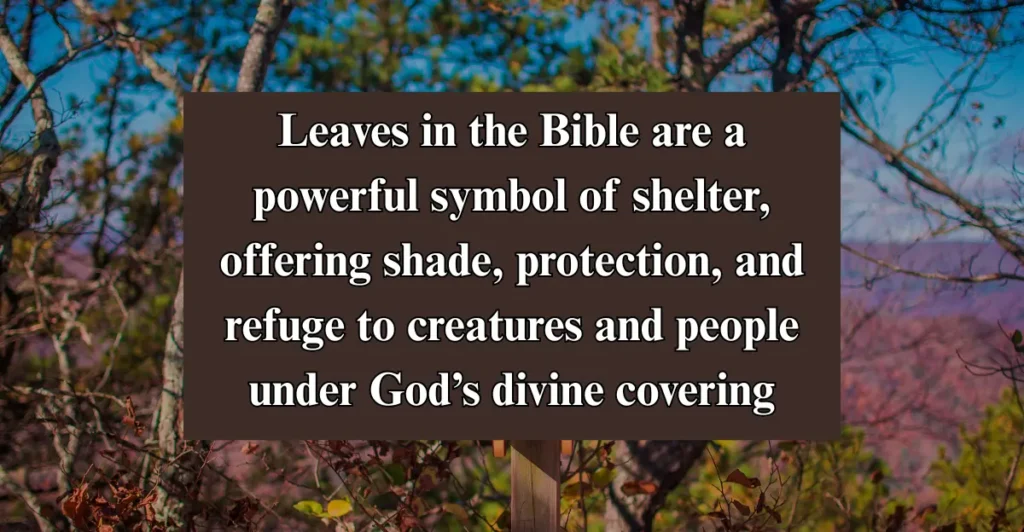
Leaves in the Bible are a powerful symbol of shelter, offering shade, protection, and refuge to creatures and people under God’s divine covering. They provide a place of rest, an offering of care, safety, and a protective presence in times of need.
I’ve often found that sitting quietly beneath a leafy tree brought a deep sense of calm like a gentle reminder of God’s unseen shield surrounding me.
Jonah 4:6
- The Lord God provided a leafy plant and made it grow up over Jonah to give shade for his head, to ease his discomfort, and Jonah was very happy about the plant.
In this verse, God shows care and provision by sending a leafy plant to offer shade and relief to Jonah from the intense heat. The plant serves as a symbol of God’s protection and concern for His creation, even in times of distress.
I’ve seen moments where God’s provision appeared unexpectedly, much like this plant bringing comfort and relief in challenging times. It’s a gentle reminder of His faithful care when we need it most.
Psalm 121:5
- The Lord watches over you the Lord is your shade at your right hand.
In this verse, the Lord is depicted as offering protection and shelter, much like the shade of a tree providing comfort from the sun. His presence stands beside His people, offering refuge and security. The branches of His care extend over us, ensuring that we are never alone or unprotected.
I have found that when life feels overwhelming, God’s care and protection often come in unexpected forms, like the shade on a hot day. It’s comforting to know His presence provides the security and peace we need in life’s storms.
Matthew 13:32
- Though it is the smallest of all seeds, yet when it grows, it is the largest of garden plants and becomes a tree, so that the birds come and perch in its branches.
This verse illustrates how the smallest seeds can grow into the largest of trees, providing shelter and security to the birds. It symbolizes how the Kingdom of God starts small but, with time, grows into a sanctuary, offering refuge and protection to those who seek it. The branches of God’s kingdom, like the leafy tree, extend to provide a place of peace and security for all.
I’ve seen how small acts of faith can lead to incredible growth in one’s life, just as a tiny seed can bloom into something magnificent. It’s comforting to know that even in the smallest moments, God’s care provides a shelter of protection.
Ezekiel 17:23
- On the mountain heights of Israel, I will plant it; it will produce branches and bear fruit and become a splendid cedar. Birds of every kind will nest in it; they will find shelter in the shade of its branches.
This verse speaks of a majestic cedar with leafy branches offering shade and shelter to birds. It symbolizes God’s provision and care, providing a place of refuge and protection for His people.
From my experience, this verse reminds me of how, even in challenging times, God offers a secure place for rest and safety, just like a tree offering shelter.
Isaiah 32:2
- Each one will be like a shelter from the wind, and a refuge from the storm, like streams of water in the desert and the shadow of a great rock in a thirsty land.
This verse illustrates God’s protection as a shelter and refuge during times of turmoil and distress, offering shade and comfort in life’s storms. It highlights His provision, like streams in a desert, a true source of support in times of need.
I’ve personally felt this divine protection when facing overwhelming situations, finding relief and strength in faith as though I’m sheltered from the storm, truly experiencing that refuge God promises.
What Does the Bible Say About Leaves
In the Bible, leaves symbolize spiritual growth, nourishment, and healing. Just like plants need water and sunlight to thrive, people need a deep connection with God for life and fruitfulness.
Leaves also remind us that without a strong relationship with God, we can become empty and lost, but through faith, there is always hope for restoration.
I’ve seen how reconnecting with my faith has helped me restore my growth, just like leaves returning to green after a storm.
Conclusion
The 35 Bible Verses About Leaves beautifully illustrate the deep spiritual lessons embedded in nature. From the symbolism of growth and healing to the reminders of God’s protection and nourishment, leaves serve as powerful metaphors for our relationship with Him. These verses encourage us to stay rooted in faith, constantly thriving under His care and guidance.
FAQ,s
What do leaves symbolize in the Bible?
In Christian religions, leaves are powerful symbols of hope during hardship, signifying the divine presence of peace, love, and renewal. In the Bible, God often uses leaf symbolism to convey His messages to prophets and chosen individuals, with the olive leaf sent to Noah after the Great Flood serving as a timeless symbol of divine hope and restoration.
